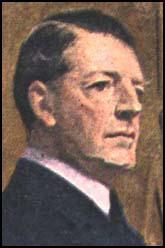David Beatty

David Beatty was born in Nantwich, Cheshire, in 1871. He entered the Royal Navy in 1884 and served in the Sudan (1896-98). As a commander of a battleship he took part in the China War (1900). During this period Beatty developed a reputation for dash and aggression. By 1912 Beatty was commander of the 1st Battlecruiser Squadron.
Admiral Sir John Jellicoe, Commander of the Grand Fleet, was concerned about Beatty's aggressive tactics and feared that he would lead the Battlecruiser Squadron into a German trap. However, his tactical boldness achieved success at Heligoland Blight (August, 1914) and Dogger Bank (January, 1915). However, Beatty's willingness to engage a superior enemy force proved expensive at the Battle of Jutland (May, 1916).
When Sir John Jellicoe was criticised for his defensive attitude towards sea warfare after Jutland, Beatty was considered his natural replacement. His promotion over the heads of eight more senior admirals created some internal resentment. When Sir David Beatty became Commander of the Grand Fleet in late 1916 he disappointed many of his supporters by following the same policy as Jellicoe. Like the previous commander, Beatty believed that the main priority was the preservation of the Dreadnoughts and was unwilling to seek a major confrontation with the German Navy. However, unlike Jellicoe, Beatty did give support to David Lloyd George and his desire for the introduction of convoys in the Battle of the Atlantic.
Admiral Beatty became First Sea Lord in 1919 and held the post until his retirement in 1927. Granted a peerage, Earl David Beatty died in 1936.
